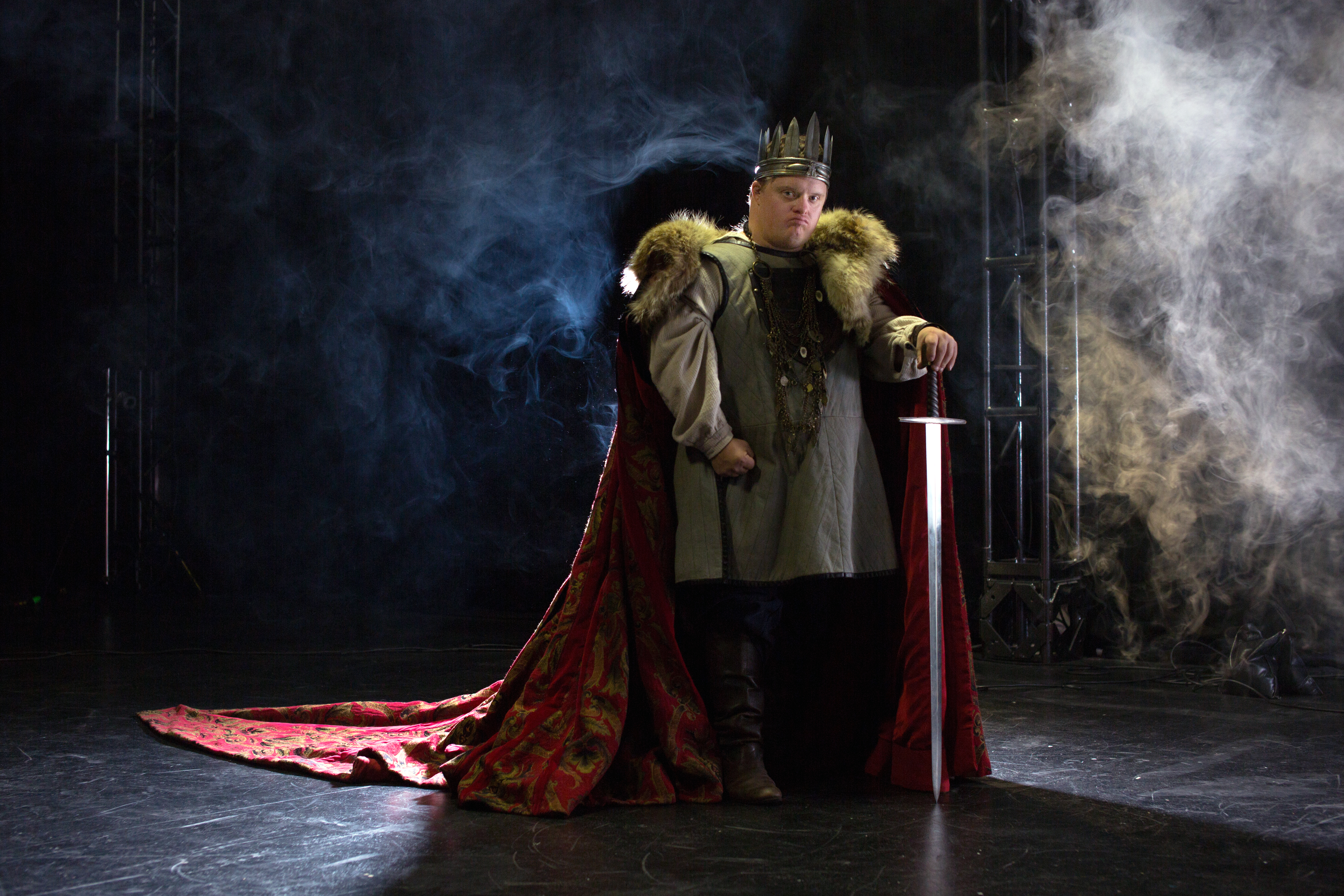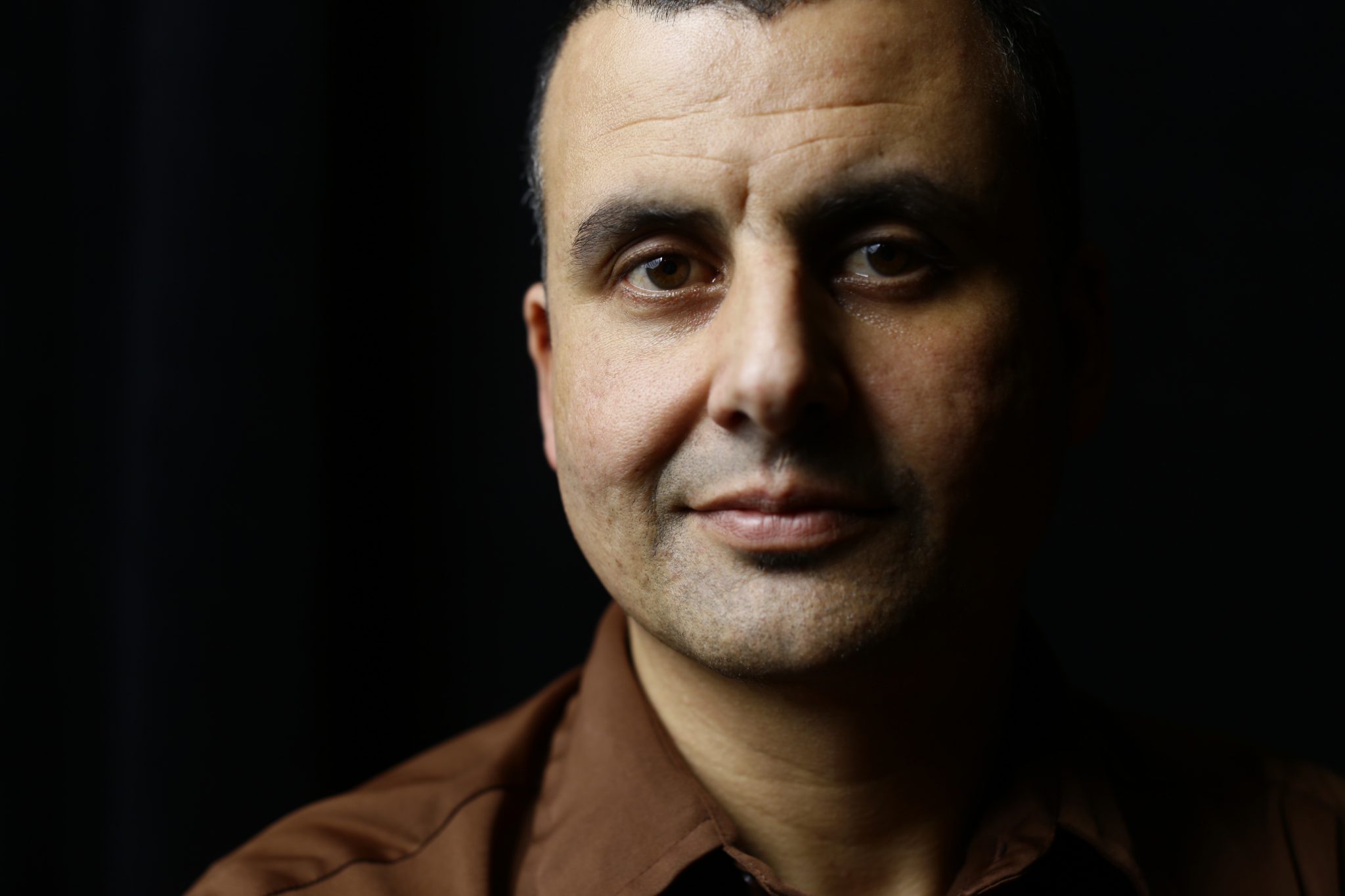Diversity on Canada's Stages

Neworld Theatre's Niall McNeil as King Arthur in King Arthur's Night.
This article originally appeared in our Spring/Summer 2017 issue of InStudio magazine. Pick one up on Banff Centre campus today.
Marcus Youssef is a Canadian theatre artist who’s also a person of colour, and he’s wondering where — in 2017 — the representations of people like him are on our Canadian main stages.
“There’s more talk of inclusion than historically there has been,” says Youssef. “But still more talk than action.”
Youssef grew up in Vancouver, the son of an Egyptian immigrant. He’s the artistic director of Neworld Theatre, a mainstay of Vancouver’s theatre community and the playwright-in-residence at Banff’s Playwrights Colony. While large regional theatres lag in terms of programming content that reflect Canada’s people, there’s a flipside to that equation that he’s discovered working with Colony Director Brian Quirt and Associate Dramaturg Jenna Rodgers at Banff.
“The Playwrights Colony in particular, under Brian’s direction, has just quietly gone ahead in a way I believe a national institution should,” says Youssef, “which is to unassumingly represent the country that it is part of.”
At the 2016 Playwrights Colony, that representation included a collaboration between Youssef, Theatre Replacement co-artistic director James Long (with whom Youssef also co-created the play Winners and Losers), and Niall McNeill, an actor with Down Syndrome, along with a cast of performers of mixed abilities.
What was unique for Youssef about working on his latest retelling, King Arthur’s Night, was that a lot of his creative journeys involved sitting back and taking notes while McNeill and the other cast members take off on flights of creative fancy.
“We’ve been been working at the Down Syndrome Research Foundation here for three years,” Youssef says, “and we’ve hired three folks from there to be in the show whose lives include Down Syndrome.”
McNeil, a professional actor who grew up on the Caravan Farm Theatre outside of Kamloops, plays Arthur in the show workshopping at Banff Centre this summer. “But [co-star] Tiffany King is playing Guinevere and she’s never acted before. Her parents told me she had been acting out movies and stories by herself at home for many years, and this was the first time she found the opportunity to do this thing she loves with other people,” says Youssef. “And she’s amazing.”
In lieu of enlisting the performers to act out an existing script, Youssef created a number of situations and a theme, then watched and listened as the performers shaped the show, rather than the other way around.
“There’s whole sections of the show,” he says, “where we ask questions, aesthetically. We all have LAV mics on, but [Niall and Tiffany] know the subject matter, and they know what the theme is. They just improvise.”
It’s an example of what Banff’s Associate Dramaturg Jenna Rodgers says is one of the moments when inclusion evolves into equity.
“Inclusion is a [first] step,” Rodgers says. “But what I think is unique about the King Arthur process is that it wasn’t just about including Niall, it was also about including his ideas in a more holistic way throughout the whole process.
“It’s not just about saying our doors are open,” she adds, “but about making space for the practices that might be necessary for diverse artists to emerge or feel safe.”
King Arthur’s Night, meanwhile, is on the fast track to a world premiere in mid-2017, with hopes that it will tour the country after that and on into 2018.

This spotlight on amplifying diverse voices is an extension of a new brand of Canadian theatre. Shows by writers such as Anita Majumdar, Youssef, and others are tackling Canada as it looks now, rather than developing work that presents an imaginary Canada, from a mythologized past that doesn’t exactly apply to how we live now.
“Often it’s those kinds of intersections I’m really interested in,” Youssef says. “Where it doesn’t conform to our kind of media or social media-driven or ideological expectation. Because real life is often a lot more complicated and nuanced than those mass-communicated kinds of stories.”
Or, as Rodgers puts it: “Why here? Why now?”
When Brian Quirt first took over as director of the Banff Playwrights Colony five years ago, the first thing he considered was what defined a play.
If playwrights wanted to work with a dramaturg to shape a text, that was fine. If they wanted to work with a choreographer to incorporate dance into the storytelling, that was fine too. Quirt soon found himself welcoming puppeteers, a Banff dog trainer and others into the retreat.
When it comes to the Playwrights’ Colony, “I’ve chosen,” Quirt says, “to define playwriting extremely broadly.”
That includes everything from Canadian theatrical legends like Victoria playwright Joan MacLeod, to Vancouver’s Anita Majumdar and her funny, smart Fish Eyes Trilogy for young audiences, all the way to King Arthur’s Night.
For Quirt, who doubles as the artistic director of Toronto’s Nightswimming Theatre, the issue of creating a theatre ecology that’s diverse and inclusive first is simply that it helps foster the creation of better plays.
Majumdar, whose recent work was developed through a number of Banff residencies, is a prime example.
“She’s one of many artists whose voices have been underrepresented on our stages and who have not necessarily been well represented at Banff — to a certain degree — over the years,” says Quirt.
“I’m not here to say it didn’t happen in the past,” he adds, “[just that] I’m just going to make it happen in the present.
“It makes a huge difference to the work,” he continues, “and we hope it makes the work stronger, more powerful, more effective — and also more producible.”
Those sorts of stories are also the kind Quirt hopes emerge from the 2017 Playwrights Colony, which will focus on developing stories for theatre for young audiences, including several Indigenous creation companies that combine dance, music, and text to tell their stories — all of which fits comfortably within Quirt’s definition of what a play is.
“It was really important for me,” Quirt says, “that these Indigenous companies, that work with dance and theatre equally, be part of the conversation that we conduct at the Colony, about which stories we tell, but [also] how we tell those stories.”
Youssef says that very devotion to developing stories that are diverse and inclusive — not to mention unorthodox and original — isn’t a luxury, but a cultural necessity.
“If a country’s culture does not reflect its social world,” says Youssef, “then it’s not going to survive.”
The King Arthur's Night residency at Banff Centre was generously supported by the Mackie Family Creation Endowment and the Maclab Enterprises Endowment. Watch our Banff Centre Presents video below to learn more about the show.